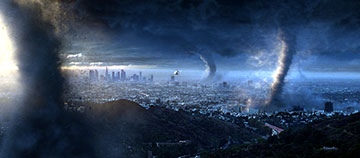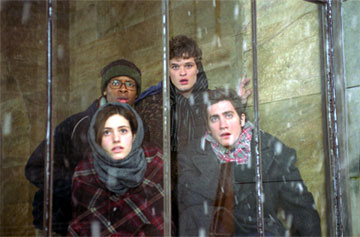

Supposedly, there is some actual "science" behind the premise of The Day After Tomorrow. However, anybody expecting a lesson in rapid climate change will be seriously disappointed. Most people with half a brain will realize that this is typical Hollywood, taking science and exaggerating it to serve its own purposes. There is a thinly veiled message about the potential destructiveness of global warming, but in reality this film is just another excuse for unbridled CGI destruction of famous landmarks. One wonders if director Roland Emmerich (The Patriot) is really an angry guy. After all, he did much of the same thing in Independence Day and Godzilla. In fact, if anybody begins to think during The Day After Tomorrow, they will realize just how stupid it is. This is not to say the movie is bad. It does serve up a great collection of scenes of tornadoes destroying Los Angeles, massive waves crashing through New York City, and other assorted natural disasters. In other words, big dumb summer flick.
Climatologist Jack Hall (Dennis Quaid, The Alamo, Cold Creek Manor) has a theory that climate change can happen rapidly, over the course of a few weeks, rather than over centuries. When the weather starts changing rapidly, scientist Terry Rapson (Ian Holm, The Return of the King, From Hell) believes that Hall's theory is correct. Hall is skeptical, and Vice President Becker (Kenneth Welsh, Miracle, Focus) is even more so. Becker happens to be the spitting image of another VP whose name just happens to be Dick Cheney. Well, the polar ice caps melt, causing the North Atlantic current to change. Massive weather systems stream across the northern hemisphere causing people to flee south, and things begin to freeze. It all looks really cool (no pun intended), but that's about as far as it goes.
Emmerich, who co-wrote the screenplay with Jeffrey Nachmanoff (The Big Gig) chose to personalize the events by looking at it through the Hall family. Hall's son Sam (Jake Gyllenhaal, Moonlight Mile, The Good Girl) is in New York with his friends Laura (Emmy Rossum, Mystic River, Passionada) and Brian (Arjay Smith) when the storm hits full force. They are forced to take refuge in the library, where they burn books to try to keep warm. Hall's wife Lucy (Sela Ward, Dirty Dancing: Havana Nights, Runaway Bride) chooses to stay behind in a hospital to be with a sick young child. Hall, who hasn't been the greatest father, manages to contact his son. He tells Sam to stay put, and that he will come for him. Why? Because he had daddy issues. And what good will it do? Well, supposedly it makes the film more dramatic. Hall begins a treacherous trek north with fellow scientists Harris (Jay O. Sanders, Along Came a Spider, Music of the Heart) and Evans (Dash Mihok, Connie and Carla, Basic). Believe it or not, their car breaks down forcing them to walk the rest of the way.
Character development is an absolute joke. Emmerich's triumvirate of disaster movies have always been light on this, and any future movies of a similar ilk will probably be exactly the same. The characters here are all laughable. Hall's quest to rescue his son is absolutely ridiculous in light of everything going on. Ward is in so little of the film that she may as well not be in it. Quaid does bring a certain seriousness necessary to the film, but only when he isn't spouting scientific mumbo-jumbo or going off on his stupid quest. Which isn't often. Emmerich moves things extremely quickly, and it's surprising that he can fit so much within ninety minutes. The Day After Tomorrow is ruthlessly efficient, ensuing that there is favoring extended sequences of waves, clouds, and hail over anything of substance. Sure it's really dumb, but in its own way, it's also kind of fun.